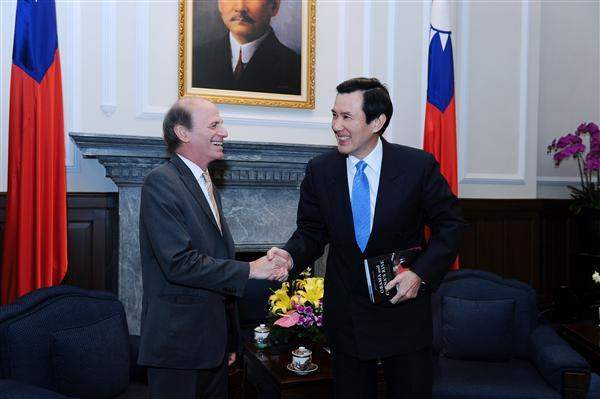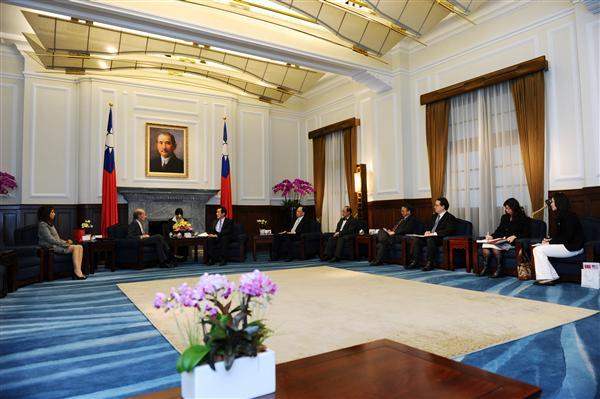News & activities
 News releases
News releases
President Ma Ying-jeou met on the morning of March 26 with Ambassador Jeffrey A. Bader, the former senior director for East Asian affairs on the US National Security Council, and Mrs. Bader. The president expressed deepest appreciation to Ambassador Bader for his longstanding contributions to relations between Taiwan and the United States. He also expressed his hopes that the United States in the second half of this year will formally include Taiwan in its Visa Waiver Program, which would help to further foster bilateral interaction.
In remarks, the president first congratulated Ambassador Bader on returning to the Brookings Institution in January of this year as the John C. Whitehead Senior Fellow in International Diplomacy. The ROC's chief representative to the United States, Jason Yuan (袁健生), sent a copy of Ambassador Bader's latest book Obama and China's Rise: An Insider's Account of America's Asia Strategy to him, he said, adding that he now has a better understanding of the background in decision-making with regard to Taiwan-US relations after reading the book.
President Ma commented that Ambassador Bader is one of Taiwan's best friends in the United States. When he was elected in March of 2008 to his first term as president, Ambassador Bader and other friends from the Democratic Party immediately urged President Barack Obama, who was then serving in the Senate and running for the presidency, to issue congratulations, and when he took office as president in May 2008, then Senator Obama sent him a personal message of congratulations and expressed his support for Taiwan's continued efforts to improve cross-strait relations, saying that this would be conducive to the development of US-Taiwan relations. Meanwhile, after President Obama was sworn into office, avenues for communication between Taiwan and the United States became quite smooth, President Ma stated, especially pointing out that Taiwan was kept abreast on talks between the United States and mainland China. This also further enhanced mutual trust in relations between the two countries.
President Ma mentioned that interaction between Taiwan and the United States has been quite close and friendly in recent years. For instance, President Obama in January 2010 and in September of last year agreed to the sale of over US$12 billion worth of arms to Taiwan. Also, in the course of the World Health Assembly last year, the US Secretary of Health during a press conference stated in the clearest terms that United Nations-affiliated organizations do not have the right to unilaterally decide the status of Taiwan. Meanwhile, United States Agency for International Development Administrator Dr. Rajiv Shah and Deputy Secretary of Energy Daniel B. Poneman both visited Taiwan in the second half of last year. Lastly, the president pointed out that Taiwan was designated as a candidate nation for the US Visa Waiver Program in December of last year, and we hope to be formally included in the initiative in the second half of this year. This would further promote bilateral relations and people-to-people interaction.
Ambassador and Mrs. Bader visited the Presidential Office in the morning to meet with President Ma. Also attending the meeting were National Security Council Deputy Secretary-General Chih-kung Liu (劉志攻), Deputy Minister of Foreign Affairs Tung Kuoyu (董國猷), and Director-General of the Ministry of Foreign Affairs' Department of North American Affairs Bruce J. D. Linghu (令狐榮達).




